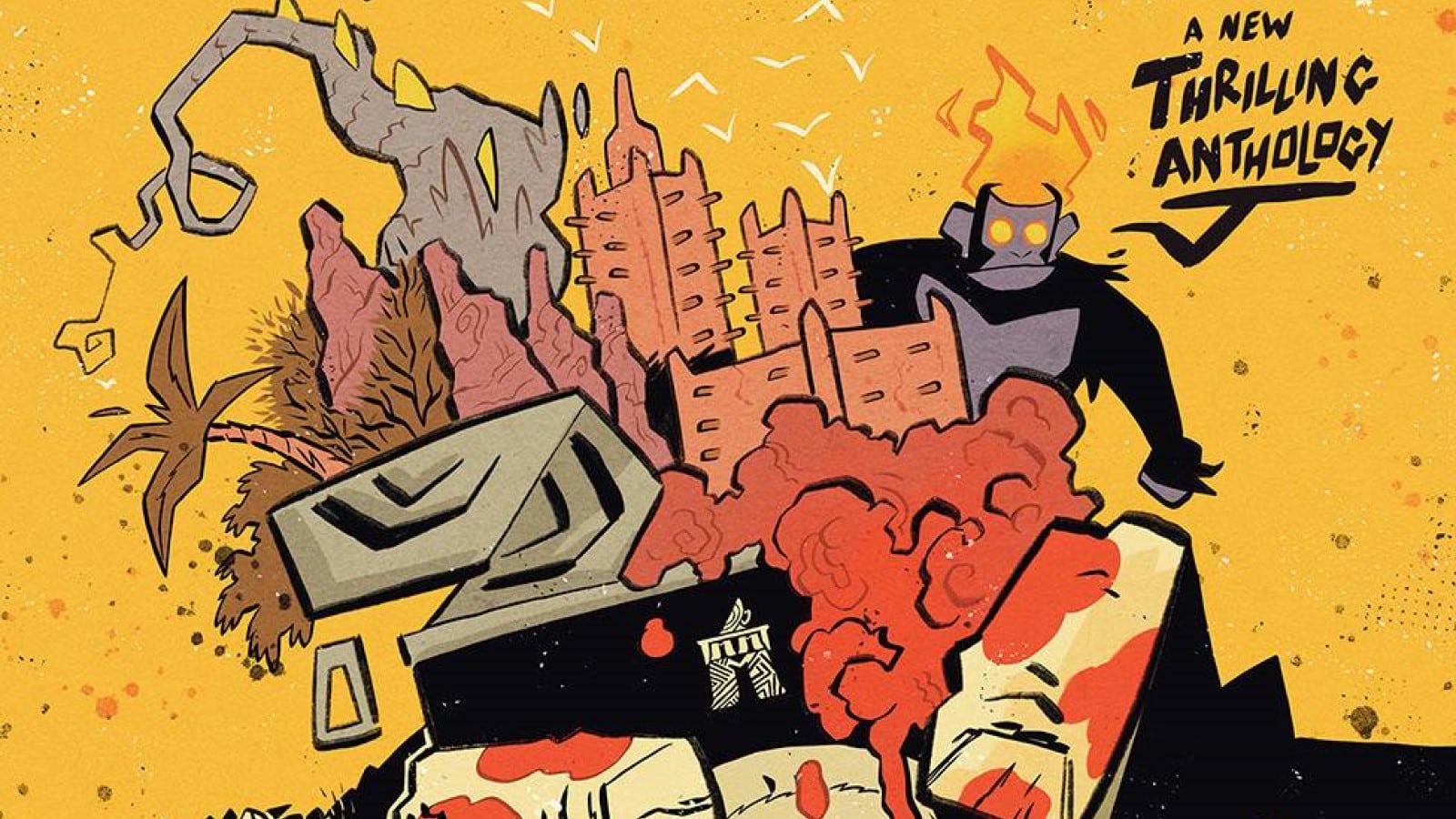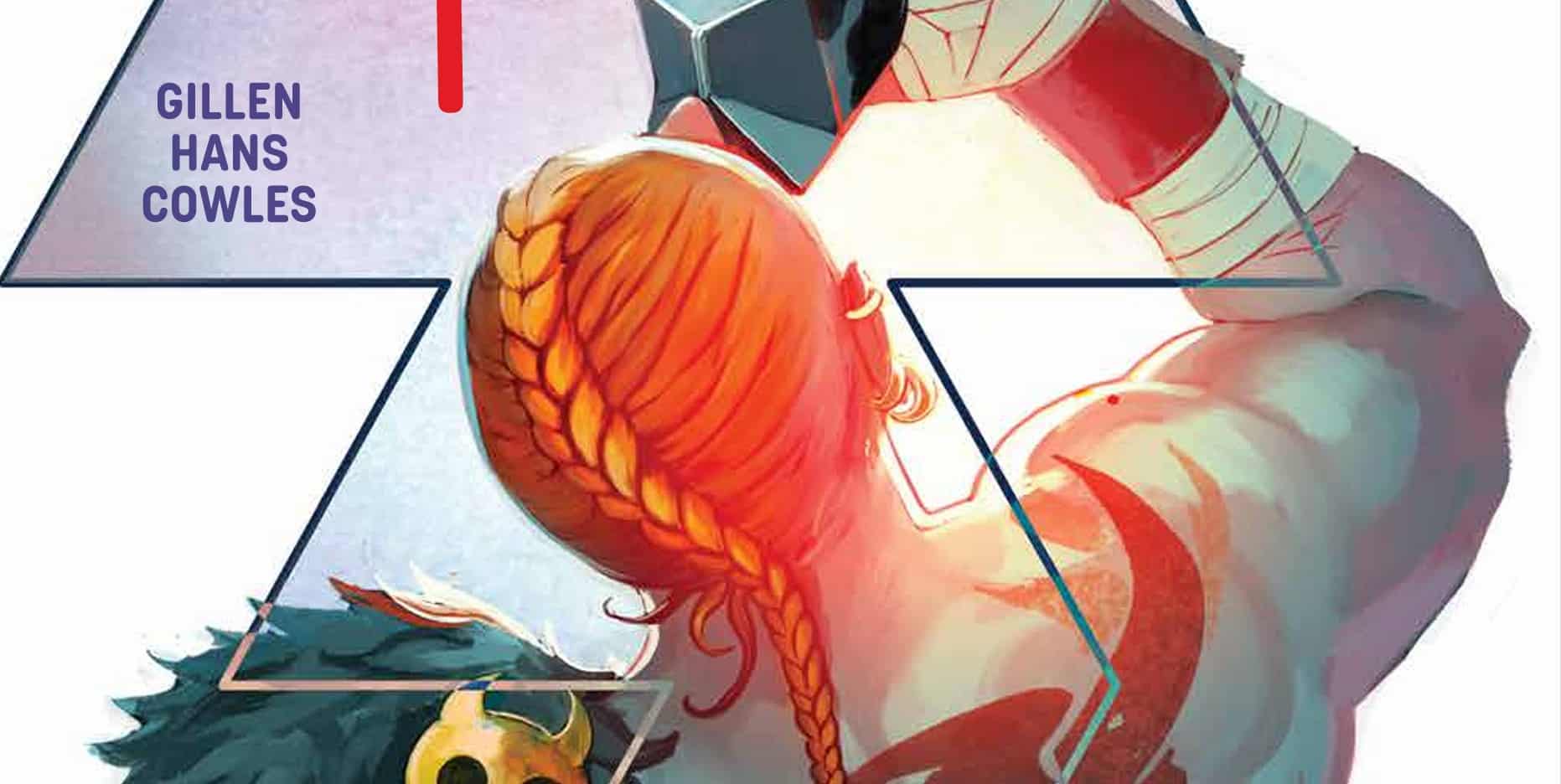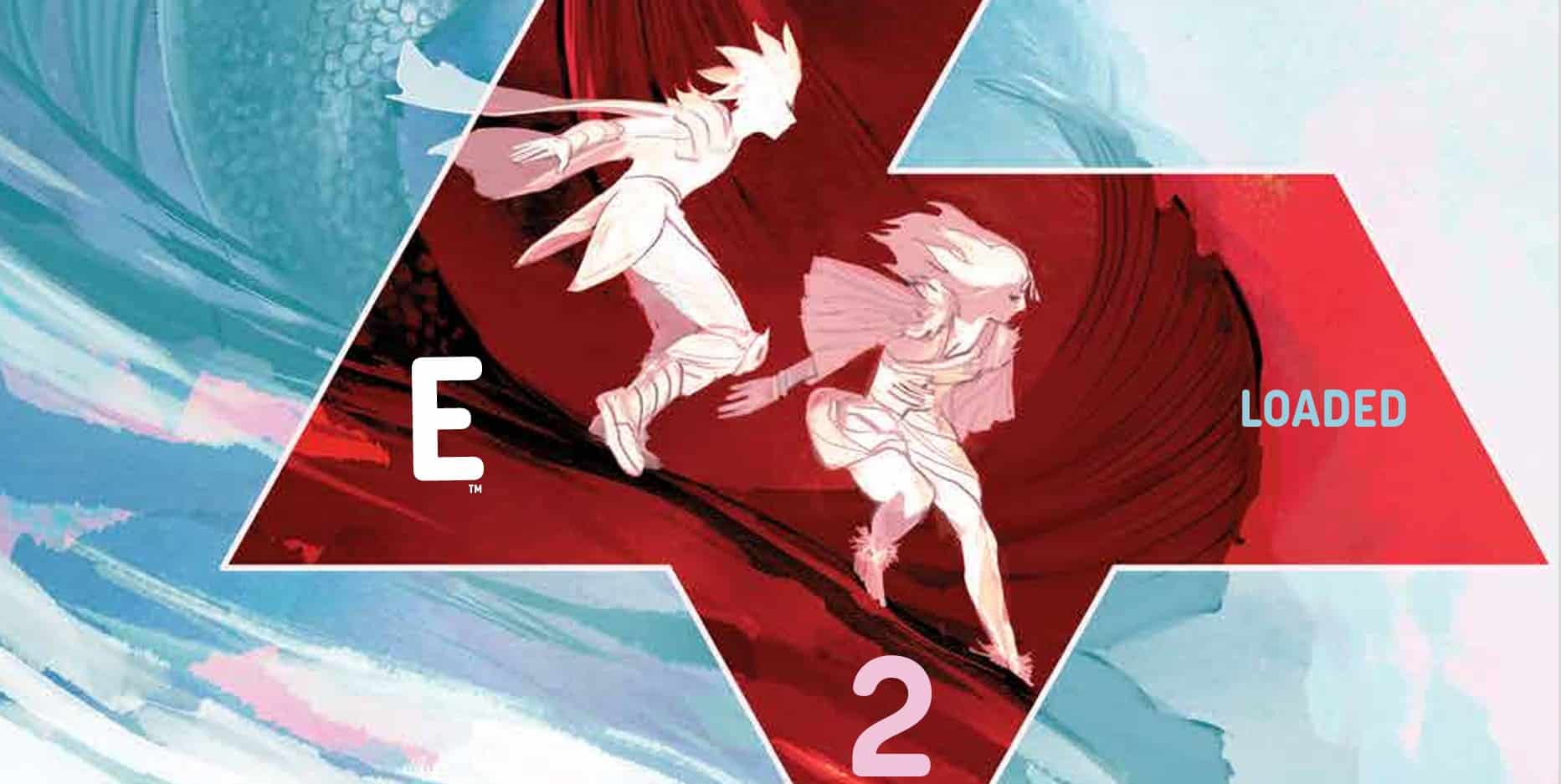Welcome to Monkey Meat Island, where the 99% authentic (we don’t talk about the 1%) Monkey Meat product is made! Every employee and resident of the island is, of course, quite satisfied with their lot in life … but if one of them wasn’t, what would their story be? Monkey Meat #1 was created by Juni Ba (with special authorization from the Monkey Meat Company).
Armaan Babu: A new #1 for a brand new comic series, I can’t think of a better way to start 2022. A new comic’s always a gamble, but I’m pleased to say I enjoyed the hell out of this comic…even if this issue’s protagonist didn’t, but I’m getting ahead of myself. Is this comic starting your year off right too, Ritesh?
Ritesh Babu: Amusingly no! I ended up re-reading some old favorite football comics very early, so this is my second comic of the year. That said, boy, what a comic! What a thrilling comic! It’s one hell of a 2022 debut, that’s for sure.
Armaan: Excellent. The Babus are in agreement: We loved this comic. Let’s talk about why.
Welcome to Monkey Meat Island

Ritesh: There’s no book out in the direct market that looks like this right now. My god, this is so stylish and so confident. But what I’m blown away by amidst all the cool, kinetic cartooning Juni Ba does is how much of it is expressing big, grand ideas in wonderful (and horrific) ways. The Monkey Meat Company may perhaps just be the ultimate monument to that sensibility. Utterly ludicrous and wild but searingly on-the-mark and brutally horrific. It’s a great combo.
Armaan: Absolutely. This thing is alive. Buzzing with energy. Every line, every splash of color, every well placed panel wants to play. This is horrific and exhausting subject matter, but Juni Ba? Ba’s fun. This comic goes through great lengths to be fun, so that when you’re sad, when you’re horrified, the beat, the playfulness keeps going.
Because there is horror here. If we were to extract the very essence of the story out of the storytelling, this would be a depressing, horrific, exhausting tale. There’s just so much vibrancy here, you can’t help but laugh.
I like how impersonal the opening is. It’s in-world marketing from Monkey Meat Multinational (putting the MMM in “Mmm, that’s good monkey meat!”) that makes it crystal clear: Here’s what we’re making fun of. There’s no muddying the waters with nuanced takes on conflicted oppressors; one of the earlier panels is monkey employees literally pulling off pieces of their bodies to dump in the cans, as a sign in the background proudly declares, “We are what you eat.”
I appreciate the outrageous simplicity of this.
Ritesh: The ties between imperialism and capitalism have always been strong. One need look no further than the most successful and powerful company in history, the East India Company, a company that once boasted an army twice the size of all of Britain, its root, and took over a nation itself. This is a comic that goes all in on that, while playing to modern hyper-capitalist corporate culture.
In regard to fun and simplicity, something I adored: The opening credits page has a big box for the entrant to collect a “ticket” (the entrant of course being us, the readers), and then we get an ad, and we’re told how this magical corporate factory of wonders is now open for us to tour and visit. The first damn thing that popped into my mind as I read, in that sense, and it made me grin, was Roald Dahl’s classic Charlie and the Chocolate Factory. I doubt that was intended, but the sort of play with that innocent, youthful idea of the “magical” corporate enterprise skewered here in brutal fashion? That’s great. Here you have an assembly line of terror wherein people massacre not only their own but themselves to produce product and get it out on the shelves.
The garish ’50s-’60s era aesthetics ad in the opener kind of sets the perfect tone for the whole thing. It’s about the image. It’s about construction. It is that which is patently absurd in how regressive and crude it is, but acquires a whole new layer of horror in its presentation here. It feels right, in a way, as the sort of “The veneer is off, they’re going all-in to the point of parody, and we’re down the absurdity rabbithole” zeitgeist of the 2020s feels perfectly represented here. It’s impossible to miss the book’s scathing critique of capitalist enterprises, and it’s done with great glee and precision.
Armaan: Glee. That’s the word that’s been hooting and hollering at the back of my mind, trying to grab my attention. This book is glee. Ba has a very clear stance on multinational corporations colonizing places for their natural resources and bleeding those places and their people dry. He thinks it’s bad, and he is gleefully illustrating just how bad he thinks it all is.
You may have been reminded of Charlie and the Chocolate Factory, but the thing I was reminded of the most was actually Samurai Jack. The wild cartoonish dystopia, blending humor with a bleak vision of the world. It’s the colors that hit the hardest for me on that front. There’s a garish cheer to them — the oranges, reds and greens of an American Halloween, meant to make you think of horror while not actually being all that horrific in themselves. It’s fun!
With our first impressions down, though, let’s get into the actual story bit — what do you think about Lug?
The Tale of Lug

Ritesh: Ah, Thaddeus Lug! He’s by far my favorite part of all of this! The other thing I’d be remiss if I didn’t mention. There’s a lot of pulp sensibility here (Take a look at Monkey Meat Island in particular), and the pulps have a long, troubling history with race in general and loving their White Saviors who take charge over natives and their lands, and usually have one of them as a servant/butler in some measure. So Monkey Meat being what it is, that’s really a lot of stuff to chew on, and Lug is perhaps its greatest expression of that.
He is the fool who bargained away his own home, his own people, his very soul … and for what? He is the tool by which the monstrous outsiders were able to ravage the lands in the way they did. He had to sign that contract and get in bed with them, helping only hurt others. Locked into a doomed deal, he has no escape, no agency, and he’s enslaved not only the kin of his homeland but himself. Lug is a man who’s bartered away the last shred of dignity and humanity he had left, becoming a barren, broken shell of himself, never even knowing why he ever did any of it at all. It’s quite sad, but there’s a truth there.
Armaan: I feel for Lug. It’s impossible not to. Look at how sad he is, signing away everything to the salesman “until my debt is paid as they see fit.”
But once again we have that distance. We move from Monkey Meat Island Marketing to a scene whose pacing seems to be controlled less by Lug than it is the perfectly coiffed manager telling Lug to get back to work — and we move from that to Lug’s story being narrated by that same manager. Lug’s story isn’t his to tell, he just messily falls into it, neck deep in the blood he’s spilled for this island.
I want to note — if you’re reading this review before reading the comic, you should know that Monkey Meat Multinational is run by monkeys. Any vague thoughts you had about monkey meat perhaps not being so terrible an option, nope. The monkeys are in charge, and they’re cannibalizing their own. The true horror, though, is that they’ve gotten people like Lug doing the same.
MMM forces Lug to do their dirty work, and in the process, he’s corrupted and mutated by the filth MMM puts out. He can no longer fit in with the people he was once a part of even if that was possible for him to do. Even his rebellions are closely monitored and allowed. Lug’s story is an employee report, a case study on how Monkey Meat Multinational’s manipulations are managing magnificently.
It’s not until much later in the book that Lug wrests control of the narrative for himself, under what may be one of my favorite quotes of the year (which, OK, isn’t saying much right now, but let me tell you, the rest of the year’s quotes are being set against a very high standard). The manager had earlier referred to MMM’s relationship to Lug as cat and mouse — but as his companion points out, “The cat dominates so much of the relationship that he forgets … it’s not a game to the mouse.”
For a comic that’s as silly as it is, that really hit me.
A Sign from God

Ritesh: That it then goes onto prove and illustrate that it is indeed just a game for the cat, regardless of the mouse’s endless resistance and attempts at agency, makes that all the more potent. Not even God is free from the contractual terms. The universe itself bends over backward to allow the bastards to eternally perpetuate their bullshit. God doesn’t care. He’s just sold your soul away with the souls of all your people. There is no peace. There is no rest. There is no heaven or afterlife. There is only the endless treadmill of The Job. You’re a slave. You’ve been subjugated. They own you, and you don’t even get the mercy of death. Death would be too kind and easy, so they’ll not even let you have that.
And so on and on it goes, like an endless respawning game of silliness for the bastards of Monkey Meat, while this is life-and-death torture for poor Lug.
Armaan: I want to backtrack to the intro for a bit, just to really get into why this moment felt especially horrific to me.
You brought up that ticket, inviting the readers to Monkey Meat Island. That ticket looked all the world to me like a window of a video game. I nearly clicked on it, expecting to be taken to the tutorial level of Monkey Meat: The Video Game. Whether it’s the similarity to a pop-up window in a good indie game, how kinetic the art is or the simple fact that our review copy is a little nicer than some of the ones we sometimes get, I am really pulled into this comic. I want to interact with it. The arrow key taking me to the next page makes me feel like I’m animating this comic.
Toward the end, like I said, Lug wrests his control of the narrative back. He’s making the choices, he’s driving things forward, the page is framed around him and his violent choices and then, there, there he is. Up there, free in heaven, at those pearly gates, and the hand that breaks through that last panel to grab Lug’s soul made me jump. It feels violently abrupt. The narrative and Lug’s freedom are just snatched back from the jaws of victory, and it’s jarring. It shook me up, and I have a lot of admiration for a comic that can do that with still images and framing.
So now that we know what this island’s all about — and the source of the 21G formula that’s worse than mere monkey meat ever was — what are you expecting for this series going forward?
Ritesh: More mad spins on corporate chaos and commodity culture! More wild framings that cut through to essential truths, and most of all, more of that glorious, glorious Juni Ba cartooning. The art in this is drop dead gorgeous.

I think I speak for both of us when I say this: Cannot wait to read more of this. This is one hell of a ride.







